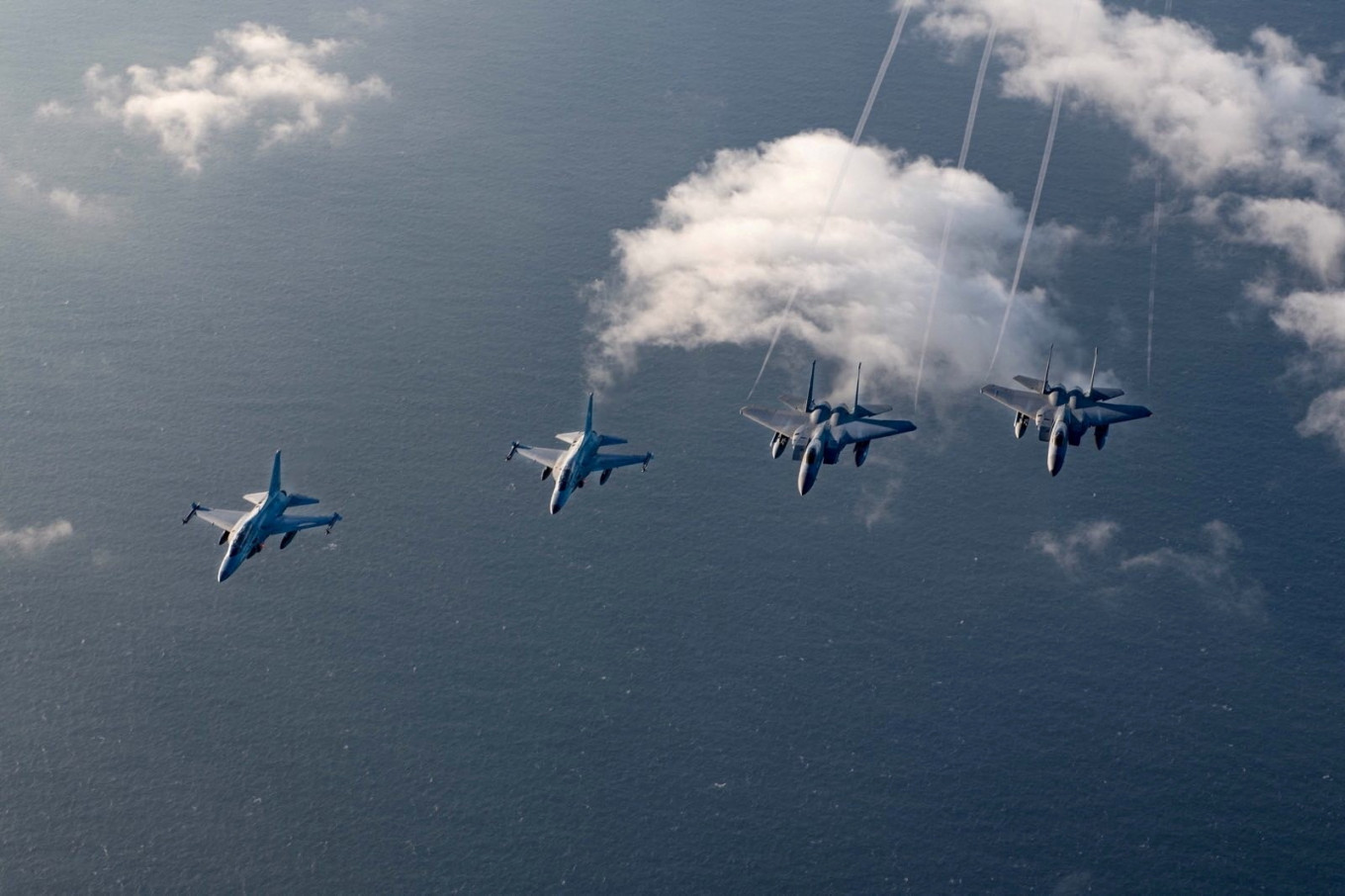Popular Reads
Top Results
Can't find what you're looking for?
View all search resultsPopular Reads
Top Results
Can't find what you're looking for?
View all search resultsASEAN unity on SCS
As existing tensions linger and continue to rise over disputed territories and the growing power rivalry in the South China Sea, the regional grouping needs to up its game – and clout – by presenting a united front.
Change text size
Gift Premium Articles
to Anyone
 Aircraft of the Philippine Air Force and the United States Indo-Pacific Command participate in a joint drill on Nov. 21, 2023 in the vicinity of Batanes, an archipelagic province, as well as in an area of the South China Sea within the Philippines’ exclusive economic zone. (Reuters/Philippine Air Force/Handout via Reuters)
Aircraft of the Philippine Air Force and the United States Indo-Pacific Command participate in a joint drill on Nov. 21, 2023 in the vicinity of Batanes, an archipelagic province, as well as in an area of the South China Sea within the Philippines’ exclusive economic zone. (Reuters/Philippine Air Force/Handout via Reuters)
A
SEAN has deemed the intensifying joint military exercises and cooperation between the Philippines, the United States and its allies, including Australia, and the related harsh response from China, as Manila’s domestic affairs.
The regional bloc might come to regret taking such a blithe stance because sooner or later, the escalating tension could erupt into a full-blown conflict between the superpowers in its own backyard.
The impression is that ASEAN is leaving it to Manila in confronting Beijing over their overlapping territorial claims in the South China Sea (SCS), as if this were merely a bilateral issue between them. On the other hand, Manila seems to consider the absence of ASEAN’s support a nonissue.
ASEAN has no consensus on either the Quad diplomatic partnership between the US, Japan, Australia and India or the AUKUS military pact between Australia, the United Kingdom and the US, which were designed to counterbalance China’s growing influence in the Asia-Pacific.
ASEAN’s summits and foreign and defense ministerial meetings have routinely raised the SCS issue. But the grouping tends to take a low-profile approach when it comes to the SCS, perhaps because China is too strong to confront and the economies of its member states depend on China. As such, tension continues to linger in the disputed maritime area.
Last month, the Philippines hosted a joint military drill in the SCS with the US, Japan and South Korea, with the UK as an observer. As usual, China issued a strong rebuke over the joint drill, calling it a concerted attempt to destabilize the high seas and vowing to retaliate any action that could harm Beijing’s interests in the area.
"Together, we send a powerful message to the world, especially to those who may seek to disrupt the peace, that our partnership is unbreakable," said Philippine Marine Corps commander Maj. Gen. Arturo Rojas, as quoted by the Associated Press.
In a statement following their Jakarta summit in September, ASEAN leaders had reiterated their long-standing position on the SCS, including that the solution to the issue should be based on international laws and norms, like the 1982 UN Convention on the Law of the Sea (UNCLOS). However, they failed to agree on a joint initiative to face China.
At an annual meeting in Jakarta last month, ASEAN defense ministers emphasized a need to maintain peace in the SCS and to exercise "self-restraint in the conduct of activities that would complicate or escalate disputes and affect peace and stability".
They also reiterated a commitment to implement the Code of Conduct in the South China Sea, which China and ASEAN agreed to create in 2002.
We have hardly seen the ASEAN member states show unity vis-à-vis China, although four of them – Malaysia, Brunei, Vietnam and the Philippines – have claims in the SCS that overlap China’s.
Meanwhile, Beijing has shown a preference for bilateral negotiations on the claims, a mechanism that strategically gives China the upper hand while weakening ASEAN.
The Philippines has been more aggressive than its fellow ASEAN litigants because of its geographical proximity and centuries-long historical ties with China. Meanwhile, Vietnam eschews outside involvement, despite the intensive approach of the US.
And while Indonesia is not a claimant, Jakarta is facing growing tension with Beijing as the latter continues to ignore UNCLOS, which guaranteed Indonesia’s sovereign right to the exclusive economic zone (EEZ) in the North Natuna Sea, located at the southern end of the SCS. China insists its fishermen have a right to fish in Natuna waters, which have been their traditional fishing grounds for thousands of years.
So far, Jakarta and Beijing have been able to manage their dispute amicably.
In light of the rising great power rivalry in these resource-rich seas, ASEAN should put aside their differing national interests and act in unity in making concerted efforts to deal with China and other players.
ASEAN unity is a must if it is to raise its bargaining power in the face of big powers.










